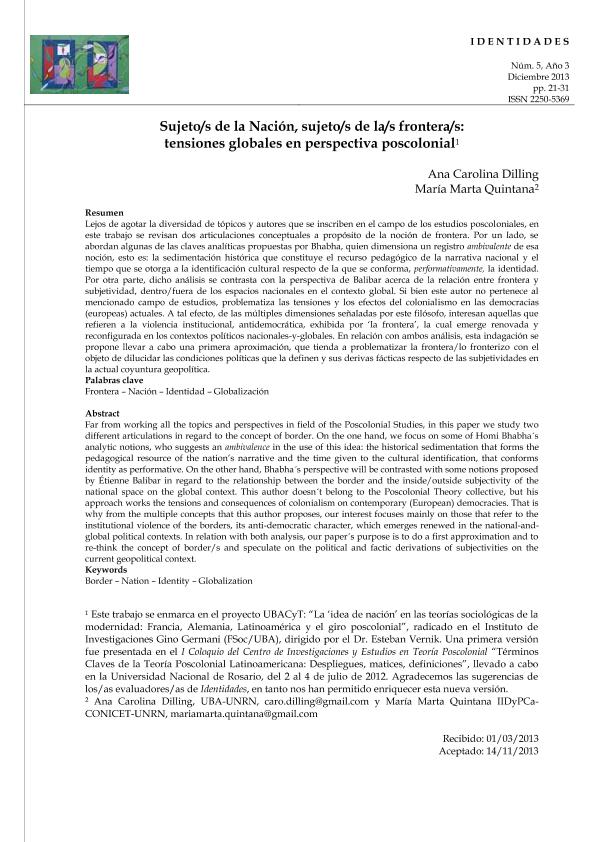Artículo
Sin pretender agotar la diversidad de tópicos y autores que se inscriben en el campo de los estudios poscoloniales, en este trabajo se revisan dos articulaciones conceptuales a propósito de la noción de frontera. Por un lado, se abordan algunas de las claves analíticas propuestas por Homi Bhabha, quien dimensiona un registro ambivalente de esa noción, esto es: la sedimentación histórica, que constituye el recurso pedagógico de la narrativa nacional, y el tiempo en continuo desplazamiento de la identificación cultural y la producción performativa la identidad. Por otra parte, dicho análisis se contrasta con la perspectiva de Étienne Balibar, quien problematiza la relación entre frontera y subjetividad, dentro/fuera de los espacios nacionales, en el contexto global. Este último autor, aunque no pertenece al mencionado campo de estudios poscoloniales, problematiza las tensiones y los efectos del colonialismo en las democracias (europeas) actuales. A tal efecto, de las múltiples dimensiones señaladas por el filósofo francés, interesan aquellas que refieren a la violencia institucional, antidemocrática, exhibida por ´la frontera´, la cual emerge renovada y reconfigurada en los contextos políticos nacionales-y-globales. En relación con ambos análisis, esta indagación se propone llevar a cabo una primera aproximación, que tienda a problematizar la frontera/lo fronterizo con el objeto de dilucidar las condiciones políticas que la definen y sus derivas fácticas respecto de las subjetividades en el actual escenario geopolítico. Far from working all the topics and perspectives in field of the Poscolonial Studies, in this paper we study two different articulations in regard to the concept of border. On the one hand, we focus on some of Homi Bhabha ́s analytic notions, who suggests an ambivalencein the use of this idea: the historical sedimentation that forms the pedagogical resource of the nation‟s narrative and the time given to the cultural identification, that conforms identity as performative. On the other hand, Bhabha ́s perspective will be contrasted with some notions proposed by Étienne Balibar in regard to the relationship between the border and the inside/outside subjectivity of the national space on the global context. This author doesn ́t belong to the Poscolonial Theory collective, but his approach works the tensions and consequences of colonialism on contemporary (European) democracies. That is why from the multiple concepts that this author proposes, our interest focuses mainly on those that refer to the institutional violence of the borders, its anti-democratic character, which emerges renewed in the national-and-global political contexts. In relation with both analysis, our paper ́s purpose is to do a first approximation and to re-think the concept of border/s and speculate on the political and factic derivations of subjectivities on the current geopolitical context.
Sujeto/s de la Nación, sujeto/s de la/s frontera/s: tensiones globales en perspectiva poscolonial
Fecha de publicación:
12/2013
Editorial:
Universidad Nacional de la Patagonia San Juan Bosco
Revista:
Identidades
ISSN:
2250-5369
Idioma:
Español
Tipo de recurso:
Artículo publicado
Clasificación temática:
Resumen
Palabras clave:
Frontera
,
Nación
,
Identidad
,
Globalización
Archivos asociados
Licencia
Identificadores
Colecciones
Articulos(IIDYPCA)
Articulos de INST. DE INVESTIGACIONES EN DIVERSIDAD CULTURAL Y PROCESOS DE CAMBIO
Articulos de INST. DE INVESTIGACIONES EN DIVERSIDAD CULTURAL Y PROCESOS DE CAMBIO
Citación
Dilling, Ana Carolina; Quintana, María Marta; Sujeto/s de la Nación, sujeto/s de la/s frontera/s: tensiones globales en perspectiva poscolonial; Universidad Nacional de la Patagonia San Juan Bosco; Identidades; 5; 3; 12-2013; 21-31
Compartir




